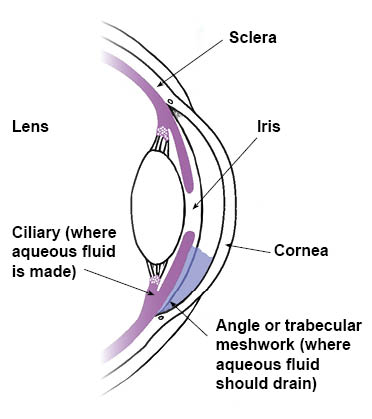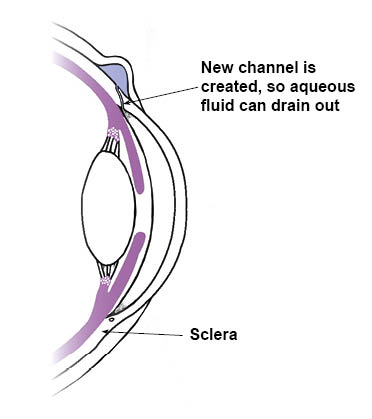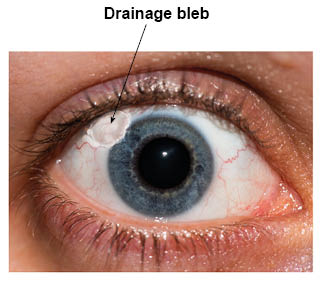Trabeculectomy: glaucoma filtration surgery
Information for patients from Ophthalmology
You have been given this leaflet as your doctor thinks that you may benefit from a Trabeculectomy operation, to help treat your glaucoma. The leaflet explains what the operation involves, the benefits and risks of it, and what you should do after your surgery.
This leaflet aims to help you decide whether you would like to proceed with this surgery and what to expect when you come to hospital. If after reading it you have any questions, please speak to the glaucoma secretary on 01233 651803.
Why have I been referred for this procedure?
This operation aims to control or slow down further visual loss that has been caused by glaucoma damage. The goal of the operation is to reduce your risk of blindness from glaucoma in your lifetime. It will not improve your vision or cure glaucoma.
What is a Trabeculectomy?
A Trabeculectomy is an operation for patients whose glaucoma is getting worse, even though they have tried other treatments.
The operation aims to lower the pressure in your eye by creating an alternative drainage channel, which will help the aqueous fluid to drain from your eye.
How successful is this procedure?
Long-term studies suggest that after trabeculectomy surgery most people will achieve a low eye pressure without the need for additional glaucoma medication. The success rate for this operation is affected by a number of different risk factors, including the patient’s age, race, previous medications, previous surgery, and the type of glaucoma they have.
The National Glaucoma Surgery Audit 2017 showed that after this surgery:
around 7 in 10 patients needed no further glaucoma medications to control their eye pressure; and
some patients need additional eye drops to control the pressure adequately.
Occasionally, if this operation fails, then another operation can be done to control the pressure. The risk of failure is higher in Afro Caribbeans.
What will happen if I refuse the treatment?
If your doctor is discussing trabeculectomy with you then it is likely that your glaucoma is getting worse or you have high pressure within your eye. If this is not treated then there is a risk of gradual, irreversible loss of vision.
Will I have an anaesthetic?
Yes, this operation is usually performed under a general anaesthetic (you are asleep for the procedure). You will be told at your preassessment appointment when you need to stop eating and drinking before your surgery.
How long does the procedure take?
The operation itself takes about 60 minutes, but you will usually have to stay in hospital for at least a couple of hours after your procedure to recover fully.
You will not be able to drive yourself home after surgery. You will need to ask someone to pick you up from the hospital or arrange for hospital transport.
Will I have to stay in hospital overnight?
In most cases this surgery is done as a day case procedure (you can go home after your surgery on the same day). If you need to stay in hospital overnight to recover from the anaesthetic, this will be explained to you by your doctor.
Is there anything I can do before I come into hospital to improve my recovery time?
Before the surgery you will need to come to hospital for a preassessment appointment. At this appointment a nurse will carry out some simple tests (for example they will check your blood pressure) and discuss with you your general health. This is to make sure that you are fit for surgery.
If you are taking any blood thinners, the nurse will discuss with you when you have to stop taking these before your surgery. They will also tell you when to start taking them again, to decrease your risk of bleeding during and after surgery.
Use this time to ask hospital staff any further questions or raise any concerns. Please note you have the right to withdraw your consent for treatment at any time.
What will happen when I arrive at hospital?
Your appointment letter will tell you where to go on the day of your procedure. This surgery can be performed in William Harvey Hospital Ashford or Kent and Canterbury Hospital Canterbury.
On admission to hospital, you will be greeted by a member of the ward staff and introduced to your named nurse. They will discuss with you the care you will receive whilst you are in hospital.
Your doctor will ask you to sign a consent form agreeing to your procedure. Please feel free to ask any questions at this stage. You can withdraw consent at any time. The nurse will let you know if you will need to change into a hospital gown. It is advisable to wear something comfortable.
You will meet your anaesthetist before surgery who will make sure you are ready for the operation.
Do not wear any make-up or jewellery, as you will need to remove it before your operation.
Who will perform my procedure?
An experienced eye surgeon will carry out your operation or they may supervise a doctor in training.
What happens during my procedure?
-
 Before surgery
Before surgery -
 After surgery
After surgery
A tiny opening is made in the white of your eye (the sclera), underneath the top eyelid; this will form a new drainage channel which will lower the pressure in your eye. The channel is kept tight with some stitches.
The aqueous fluid drains through this channel from inside your eye onto the surface of your eye, forming a ‘lake of fluid’ called ‘a bleb’. This is covered by the thin outermost lining of your eye and tends to form under the upper eyelid.
The operation is done using very fine instruments and tiny stitches (sutures) which need the use of a microscope.
What are anti-scarring medications?
The main reason Trabeculectomy surgery can fail is that the newly-created drainage site can scar, due to your own body’s natural tendency to heal.
There are medications that can help prevent scar tissue formation; the medical name for these is antimetabolites. These are used to limit scarring and improve the success rate of your operation. The most commonly used antimetabolites are mitomycin C (MMC) and 5-Fluorouracil (5FU). These can be used at the time of your surgery or afterwards.
Are there any risks to having this procedure?
As with all surgery, this operation carries some risks and complications. It is important that we tell you about these risks so that you have the information you need to make a decision about your operation. These complications can happen during surgery, shortly after surgery, or many months or years after surgery.

Bleeding is a serious but rare complication. It can lead to loss of vision and even blindness, although this is very rare.
An infection inside the eye can be very serious and can also cause loss of vision or blindness. This is also rare (one patient in every 1000 may get this).
After the operation, your eye pressure may be too high or too low. If this happens, you may need more treatment, a minor procedure to adjust it, or sometimes more surgery.
Some patients are aware of the drainage bleb under their upper eyelid, or have a slight drooping of their eyelid, but this usually settles down.
Eye discomfort might happen after surgery due to the interference of the bleb with the tear film. This happens to around 1 in every 10 patients but is usually treatable with lubrication eye drops.
As your eye settles down and heals, you may need to change your glasses to get your best vision.
Cataracts may progress or form and the vision of 1 in 5 patients may get worse. If this happens you may need cataract surgery (usually more than six to 12 months after the glaucoma surgery).
Some people with very advanced glaucoma may have a permanent complete loss of vision and their visual field. This is called a ‘wipe out’ phenomenon and is quite rare.
How will I feel after my procedure?
You will have a plastic shield to wear over your eye.
In the first few days following your operation, your eye may feel a little sore but most patients do not complain of much pain. Simple painkillers, such as paracetamol, usually help to ease any pain or discomfort.
You must rest for a few days following your operation and not exert yourself. Despite having had a major operation on your eye you will probably feel quite well. But it is important to remember to be sensible and to rest yourself to give your eye the best chance to heal.
You will be given eye drops to reduce any inflammation and protect against infection. The hospital staff will explain how and when to use these.
The eye drops you will need to use in your operated eye will be different from the drops that you used before your operation (previous drops should be stopped after your surgery unless you are told otherwise). In your other eye, please carry on using your glaucoma drops as usual.
It is normal for your vision to be blurred for several weeks after your operation, and for your eye to feel gritty and a little sore.
Do not rub your eye in the first week after your operation.
For the first week after surgery wear your glasses during the day and the plastic shield at night to protect your eye.
Try to keep your head above the level of your heart at all times (no bending, stooping, or lifting heavy objects).
Avoid smoky or dusty places and forceful sneezing or coughing.
Do not get water in your eye. For the first couple of weeks following your surgery wash your hair backwards over a sink and avoid irritants such as soap near your eye. Do not swim for at least a month after your surgery.
Do not wear contact lenses for about eight weeks.
Do not use eye make-up for four weeks.
Will I need a follow-up appointment?
You will be reviewed in the outpatient clinic the day after your operation, and then every week for four weeks.
Usually, your surgeon will leave your eye at the target pressure by the end of your surgery, but in some patients at some point after their operation the doctor will need to do some form of ‘bleb manipulation’ in the clinic (for example stitch adjustment or removal, eye massage to open up the trapdoor flap, or give an injection of anti-scarring drugs). This does not mean that the operation has failed. It simply means that the flow of fluid out of the eye needs help.
Complete recovery might take up to two months.
When can I return to work?
You will need to have at least two weeks off work. Please speak to your doctor about this before your surgery.
When can I drive again?
Do not drive until after your first outpatient appointment, when this can be discussed with your doctor.
It is your responsibility to make sure that you are safe and legal to drive. If you are not sure, then contact the DVLA and ask for advice.
What should I do if I feel unwell at home?
If you have any of the symptoms listed below, please contact William Harvey Hospital on 01233 633331 immediately. If you call before 5pm ask to speak to the ophthalmology triage, if you call after this time ask to speak to the ophthalmologist on call.
A very painful eye.
Discharge from your eye.
Eyelid swelling.
Loss of vision.